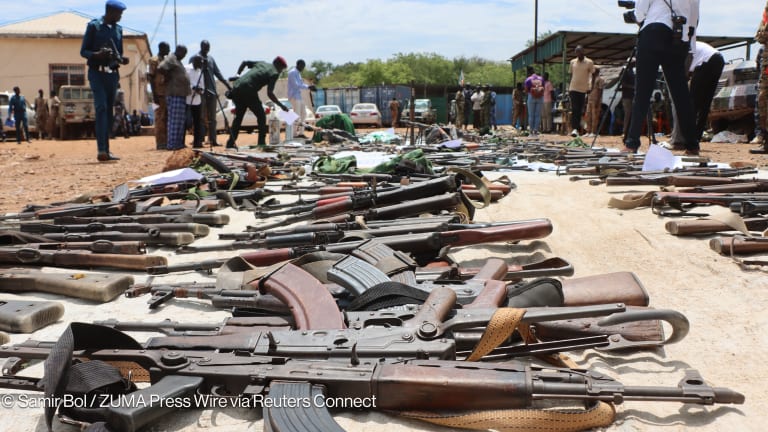
OUAGADOUGOU, Burkina Faso — Mounting violence in Burkina Faso has plunged the once peaceful West African nation into crisis. Near daily attacks by militants linked to the Islamic State and al-Qaeda, as well as by local defense groups, show no signs of abating. Almost 2,000 more fatalities were reported last year than in 2018, a six-fold increase, according to the Armed Conflict Location & Event Data Project.
“When you work in development, when you recruit someone, it can take one to two months, maybe more, but for emergencies you have to recruit in two or three days.”
— Nicolas Charpentier, head of mission in Burkina Faso, TDHThe surge in violence has fueled a dire humanitarian situation, creating one of the fastest- growing displacement crises in Africa, according to the United Nations.
Two million people are in need of assistance and almost 800,000 people are internally displaced. The country is also one of the hardest hit on the continent in terms of the coronavirus outbreak, with 384 confirmed cases and 19 deaths as of Wednesday.
The violence has forced aid groups and donors operating in Burkina Faso to shift operations from a development to a humanitarian focus — a complicated process that involves challenging established working norms and convincing donors to adapt new funding approaches. The transition was slow to start and remains under-funded, aid workers with experience in the region tell Devex.
Humanitarianism is a 'fallen angel,' says MSF president
Humanitarian work has lost the widespread support it once enjoyed, according to Dr. Christos Christou, president of Médecins Sans Frontières.
Before the violence began in 2015, Oxfam, an organization operating in Burkina Faso since the 70s, focused largely on longer-term projects, including climate-related work, food security, and helping reduce economic inequality. The group now works on development and humanitarian initiatives, and partners with more than 40 local organizations, not all of which have experience operating in insecure environments.
“The transition in Burkina Faso was rapid, and although Oxfam was able to mobilize quite quickly, our partners do not always have the same capacities or resources to do so,” said Sosthene Konate, Oxfam country director for Burkina Faso.
When the crisis began in 2015, Oxfam scaled up emergency programming to provide clean water and food to vulnerable populations, as well as to incorporate protection measures for civilians into existing programs to ensure people felt safe and knew where to report abuses. The change required training for local aid partners about how to work with communities to ensure the team wasn’t transferring additional risks to the population.
Staffing shifts
The move to an emergency context has been a strain on staff and resources, Konate said. Oxfam has shifted some staff who were previously working on development projects to address humanitarian needs, meaning there are less resources available for longer-term initiatives.
There’s also been increased emphasis on security. Starting last year, Oxfam requires staff to take a hostile environment training course and has so far trained 50 people. But for organizations that have been working in development in Burkina Faso for years, finding the right staff for emergency response can be challenging.
After more than three decades of development work in the country, Terre Des Hommes Lausanne, a Swiss international aid group focused on child protection, health, and food security, initially faced challenges switching to a humanitarian context.
“It took some time to adjust our internal organization and processes to be able to deliver assistance in a short time, said Nicolas Charpentier, TDH head of mission in Burkina Faso.
“When you work in development, when you recruit someone, it can take one to two months, maybe more, but for emergencies you have to recruit in two or three days,” he said.
Emergencies, as compared to traditional development work, require a tight proposal timeline, shorter project durations, and urgency when it comes to setting up a team, he said. The shift has also forced the group to work with both development and emergency contexts within the same area.
“If you support a health system in a district and suddenly in part of the area all the health centers are closed, you could be in a position to deliver services yourself, while in the other part you’ll continue supporting the health system, and this could be complex for partners to understand and accept,” he said.
Metsi Makhetha, U.N. head in Burkina Faso, thinks aid workers in the country need to have experience in both development and humanitarian contexts.
“Investing in humanity — as in saving lives, alleviating suffering and helping create conditions for hope and dignity — requires a commitment to humanitarian work while at the same time being able to sit at the table with those supporting or leading the country's development efforts,” Makhetha told Devex.
“We cannot afford to be dogmatic but should instead use the principle of ‘do no harm’ by ensuring that critical services ... are provided by the state for everyone,” she said.
“It’s like turning around the Titanic.”
— Jackie MacLeod, head of mission in Burkina Faso, International Rescue CommitteeThe (im)practicalities of the nexus
Makhetha and international donors are placing importance on the continuity of development work while also focusing on the humanitarian response, an approach referred to as the ”humanitarian-development nexus.”
But some organizations feel the nexus, while strong in theory, doesn’t practically play out because donors haven’t adapted to it.
“Absolutely you can do both at one time. With enough money we could have a team doing resilience work and a team side-by-side responding to emergency, but in reality no one’s funding that,” said Jackie MacLeod, International Rescue Committee head of mission in Burkina Faso.
Instead, donors fund in silos, either for development or humanitarian initiatives, which makes it hard to apply for projects that address both at the same time. Some of the current funding streams don’t necessarily help organizations struggling to meet the growing humanitarian needs, such as providing vulnerable populations with health services, water, and shelter, MacLeod said.
Over $300 million is needed for Burkina Faso’s humanitarian response plan this year — three times the amount requested in 2018, yet approximately 10% is funded.
There is a particular shortage of longer-term funding that would allow groups to hire new staff and cover overhead costs, according to aid groups Devex spoke with.
Some donors, however, have been flexible about redirecting aid. When Oxfam’s food security project was impacted by violence in the Sahel, the epicenter of the crisis, the EU allowed Oxfam to shift its area of operations as well as the type of project it was doing to a different part of the Sahel that was more accessible, Konate said. The group changed focus to water and sanitation.
Makhetha of the U.N believes that a number of donors are stepping up to finance in a “complementary manner,” which has the potential to reduce humanitarian needs over a short period of time while enabling communities to enjoy benefits of development, she said.
The U.S. Agency for International Development, which currently has a $49 million, five-year grant for a development program focused on youth, told Devex it will “significantly increase” its commitment to Burkina Faso’s deteriorating humanitarian situation while continuing to invest in development to ensure the country continues progressing after the crisis is over, according to a USAID spokesperson.
The EU, which has provided over €1 billion ($1.1 billion) in humanitarian and development assistance in the country between 2014 and 2020, is also focusing on an integrated response, However, it might be “difficult and perhaps, unfeasible, to implement a nexus approach and resilience actions in non-accessible areas, where more humanitarian funding is needed,” according to an EU spokesperson.
But some aid groups think donors still haven’t caught up to the need or the speed of the response, which requires more reliable funding to allow them to more effectively attend to the crisis. Humanitarians are also worried about coronavirus, which means many organizations will be more stretched than before.
“Donors need to realign the priorities and need to realize that there’s a humanitarian crisis happening here and potentially need to shift resources towards the emergency response,” said IRC’s Macleod.
“But it’s like turning around the Titanic,” she said.








